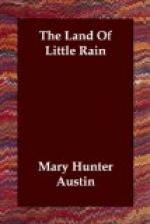I said we had the church fair at the Silver Dollar. We had most things there, dances, town meetings, and the kinetoscope exhibition of the Passion Play. The Silver Dollar had been built when the borders of Jimville spread from Minton to the red hill the Defiance twisted through. “Side-Winder” Smith scrubbed the floor for us and moved the bar to the back room. The fair was designed for the support of the circuit rider who preached to the few that would hear, and buried us all in turn. He was the symbol of Jimville’s respectability, although he was of a sect that held dancing among the cardinal sins. The management took no chances on offending the minister; at 11.30 they tendered him the receipts of the evening in the chairman’s hat, as a delicate intimation that the fair was closed. The company filed out of the front door and around to the back. Then the dance began formally with no feelings hurt. These were the sort of courtesies, common enough in Jimville, that brought tears of delicate inner laughter.
There were others besides Mr. Fanshawe who had walked out of Mr. Harte’s demesne to Jimville and wore names that smacked of the soil,—“Alkali Bill,” “Pike” Wilson, “Three Finger,” and “Mono Jim;” fierce, shy, profane, sun-dried derelicts of the windy hills, who each owned, or had owned, a mine and was wishful to own one again. They laid up on the worn benches of the Silver Dollar or the Same Old Luck like beached vessels, and their talk ran on endlessly of “strike” and “contact” and “mother lode,” and worked around to fights and hold-ups, villainy, haunts, and the hoodoo of the Minietta, told austerely without imagination.
Do not suppose I am going to repeat it all; you who want these things written up from the point of view of people who do not do them every day would get no savor in their speech.




